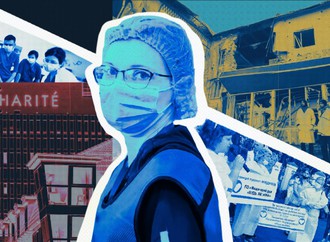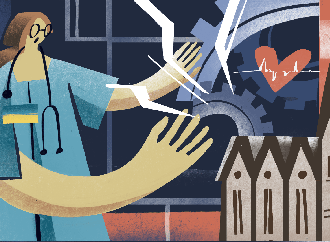
Many Ukrainian doctors risked their lives in order to save others. This article explores the narratives of healthcare professionals who, in spite of the warfare, stayed by their patients and fulfilled their duties. Among them, is a family doctor who responded to emergency calls amidst shelling, a senior nurse who organized a hospital in her own home, and a paramedic who provided aid to bedridden patients in a cold and powerless medical facility. These narratives abound, though there remains to show a sufficient acknowledgement of healthcare professionals’ efforts by the state. Despite increased workloads, salaries for medical personnel remain low, and many hospitals lack essential medications and new equipment. This publication explores both the pride and challenges of the Ukrainian medical system.
Unintentional Surgeon
In the early days of the full-scale invasion, many hospitals and pharmacies continued to operate, even as Russian forces entered populated areas. Although later, prompted by shelling, challenges in food supplies, and disruptions in heating and electricity, numerous workers relocated to safer regions.
However, a significant number of healthcare workers stayed and persisted in their duties. Among them was Alexander Dudik, a family doctor at the outpatient clinic in the village of Kiselivka in the Kherson region. Dudik shared with our journalist that he had no intention of fleeing because he firmly believed that the Ukrainian army would eventually regain control of the territory. Furthermore, he noted that, aside from himself, there was no one else available to treat the villagers.
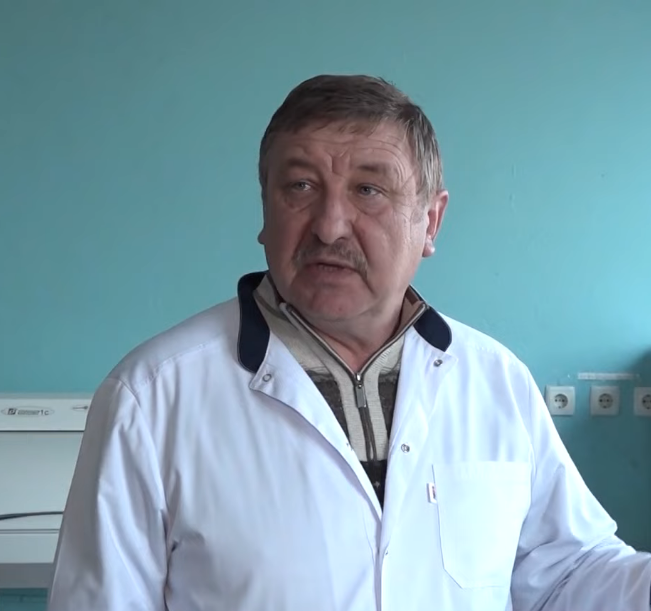
Alexander Dudik. Photo: ICTV
Every day, the doctor found himself providing assistance not only to the residents of his village but also to individuals from neighboring settlements, who traveled tto Kiselivka to see the doctor. At first, he cared for patients at the outpatient clinic, but when the building was shelled, he started providing medical care in his own home. To come to the aid of those who were unable to move independently, he traveled using a bicycle. These journeys were often dangerous; the doctor frequently came under fire and had to seek cover by falling to the nearby fence – once resulting in damage to his bicycle.
Family doctor Alexander Dudik recalls a moment when he had to assume the role of a surgeon.
“I pulled out fragments, stitched wounds – things I hadn't done since my youth. However, people had no alternative but to turn to me, and I had no other option either. So, I bandaged, stitched, and treated... On the other hand, many locals were aware of my patriotic stance and probably reported it to the occupiers, but they didn't interfere, maybe because of the absence of other doctors nearby.”
There was only one occasion that the doctor thought he may not survive. Once, Russian military personnel with insignias of Kadyrov units came to him, insisting he surrender amphetamine pills.
“I said that I don't deal with drugs. The senior one suggested that I think again, but I stood firm in my response. I thought this was the end for me. But the “kadyrovites” left,” Alexander related.
Now, he finds his work somewhat easier thanks to volunteer doctors who come to the village once a month.
Surviving in the Hospital
60-year-old junior nurse in the neurology and therapy department, Tatyana Tarasenko, was honored with the Order of Princess Olga of the III degree for her dedication to caring for patients in the city hospital of Trostianets, in the Sumy region, during the occupation by Russian military forces. The city fell under occupation at the onset of the war. From mid-March, the conditions deteriorated significantly – shelling intensified, the hospital's heating system was damaged, and windows were shattered.
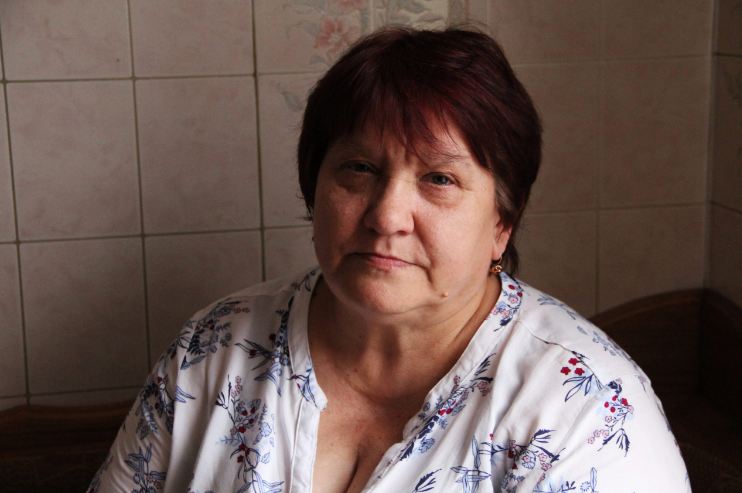
Tatyana Tarasenko. Photo: cukr.city
Due to fear, cold, and food shortages, patients and staff had to leave the five-story hospital building. By March 21st, only 5-6 medical workers and 10 patients, including 6 bedridden individuals, remained in the medical facility. Due to shelling, plaster fell from the walls and occasional fires broke out, which the staff fortunately managed to extinguish in time. Tatyana vividly recalls that despite living nearby/
“Leaving the workplace was out of the question. Leaving patients without help didn’t even cross my mind,” she told the publication.
The woman continued to perform her routine tasks: changed patients' clothes, wiped them with sanitary napkins due to the lack of washing facilities, covered them with blankets, and provided nourishment. The medical team improvised a stove for making tea and cooking soups. As food shortages became apparent, they gathered resources from various hospital departments and resident physicians. On one occasion, they found flour and baked bread, distributing it in small portions to ensure everyone received some. The only available mobile communication spot was on the top floor of the hospital, prompting Tatyana to assist patients who could move a little to reach the area and communicate with their relatives.
On March 27th, Russian forces retreated, and volunteers evacuated the remaining patients to a safe place. The hospital building was completely restored within a year, allowing medical workers to return to their duties.
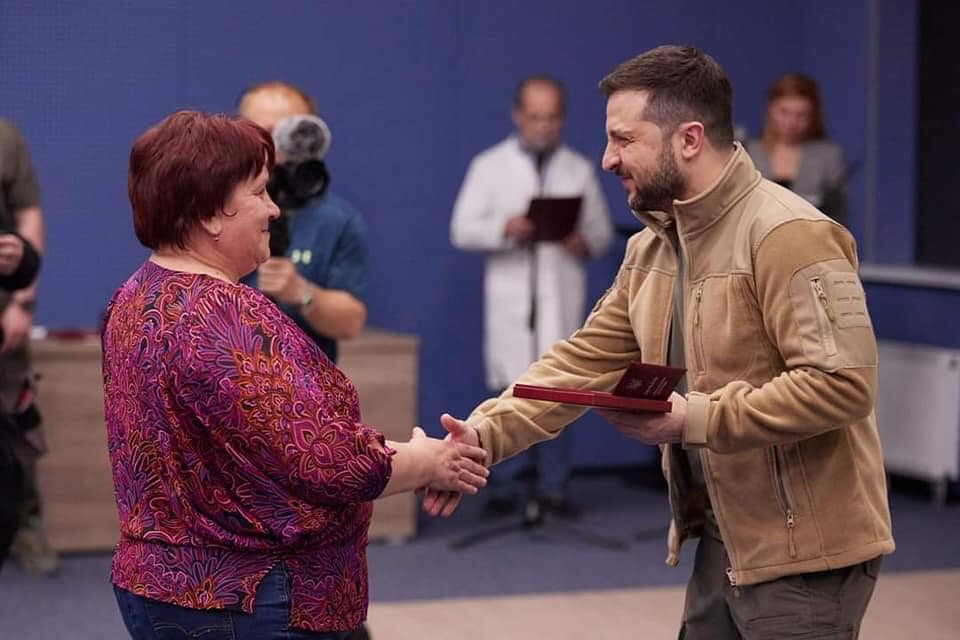
Tatyana Tarasenko receives an award from the President of Ukraine Volodymyr Zelenskyi. Photo: Trostianetska City Council
In addressing challenges in her work, Tatyana Tarasenko emphasized persistently low wages. Currently, her monthly salary, after deductions, makes up a mere 5,700 hryvnias, while her workload is enormous.
“Here lies a stroke patient. You have to turn him, lift him, change him multiple times. By the evening, you run out of strength, you have to seek assistance from a nurse for help. You can't leave a person lying in filth! Many patients want to talk, to share their concerns, to express emotions. You try to listen to everyone,” she said.
Furthermore, Tatyana is responsible for delivering food to the wards and cleaning the premises. In the department where she works, there are ten rooms, each with a toilet and a bathroom, along with two common toilets; the upkeep of hygiene is a continuous task.
“It's not about the toilets; but there needs to be some attention to our work! They raised salaries for doctors and nurses, and not a word about sanitation workers. If they had at least increased it by a thousand hryvnias. It's unfortunate that our work is so undervalued,” Tatyana Tarasenko said.
Hospital at Home
The chief nurse of the Vysokopil Hospital in the Kherson region, 66-year-old Nadiya Tsalinska, refused to provide medical assistance to Russian military personnel when they set up headquarters in the local hospital. Instead, she, along with her friend, nurse Valentyna, seized medicines and medical instruments and began offering aid to fellow villagers in her own home.
With extensive experience from years of working in the surgical department, Nadiya not only provided basic medical care but also performed intricate tasks such as extracting fragments and bullets from the head and abdominal cavity. She recounts days when as many as 15 people sought help, all while facing constant shelling. Her house was damaged three times, and during the last shelling, her husband lost his life.
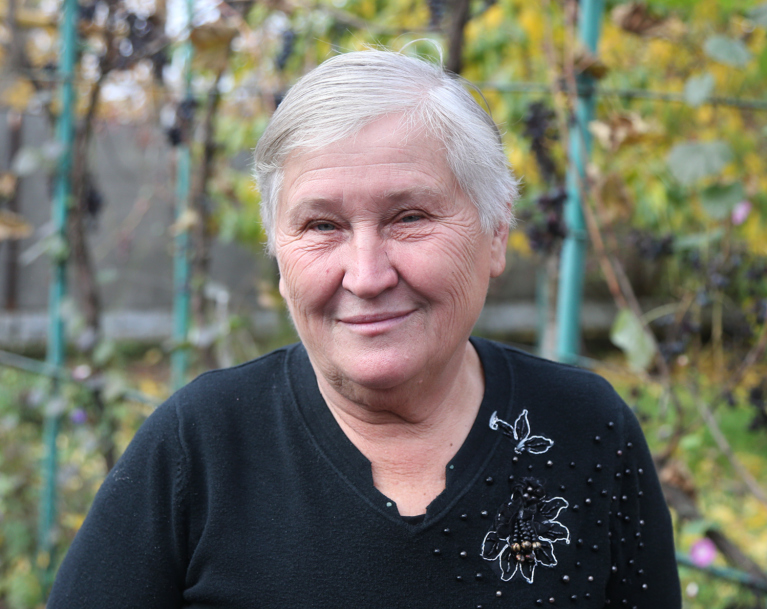
Nadiya Tsalinska. Photo: mipl.org.ua
Initially, the Russian military did not bother the nurse. However, after capturing a wounded Ukrainian soldier in captivity, who had a stitched brow and was being hidden by locals in a house for the elderly, they began daily visits to Nadiya. They suspected she had provided medical assistance to the soldier. Consequently, they prohibited her from leaving the yard, and inspected her house almost daily. When there were no "personal visits," a drone hovered over the house, prompting the nurse to step outside so the operator could see her. Nadiya's behavior remained non-suspicious, leading to the ultimate cessation of these "inspections."
Nadiya Tsalinska also helped her fellow villagers by providing food:
“I was not afraid of the occupiers, and once I even told them directly that a humanitarian catastrophe was looming in the settlement. I said, 'People have nothing to eat!' And the next day, the soldiers brought us groceries: a sack of flour each, sugar, and pasta. My friend and I compiled a list of streets and started delivering products on bicycles. We gave each family two bags of flour and pasta, along with one bag of sugar. We also baked bread. Many people hadn't seen anything for months, and upon receiving these provisions, they cried.”
Presently serving as a senior nurse, Nadiya has no plans to retire as long as she possesses the strength. Simultaneously, she expresses concern about the state’s approach to the education of future healthcare professionals. Nadiya's two granddaughters enrolled in medical school, one on a budget, and the other on a contract basis. The cost of one year of contract education totaled 32,000 hryvnias. When the parents faced challenges in work and finances, the student had to withdraw. Nadiya Tsalinska believes that, for the country to provide high-quality and accessible medical education, the cost of education should be significantly reduced or even made free.
“Paying 30-40 thousand hryvnias per year and studying for eight to nine years to then receive a salary of 7,000 hryvnias? And how do you 'recoup' the money spent? The next problem is the quality of education. My second granddaughter is in her third year studying to become a rehabilitation doctor. What kind of rehabilitation doctor can she be when her classes are conducted remotely? She needs practice, an understanding of how muscles work. I generally believe it will be dangerous to go to such doctors. As a result, I have to help my granddaughter, and she practices under my supervision. But it shouldn't be this way,” says the nurse.
A Medic Shouldn't Contemplate Extra Income
Despite not working in the conditions of occupation, young obstetrician-gynecologist Anton Belinsky frequently traveled to the occupied territories. He joined the "Medical Desant (landing operation)", an organization dedicated to providing volunteer medical support to the population. The group was formed by professional doctors, equipped with necessary gear and medicines, enabling them to conduct comprehensive examinations of patients.
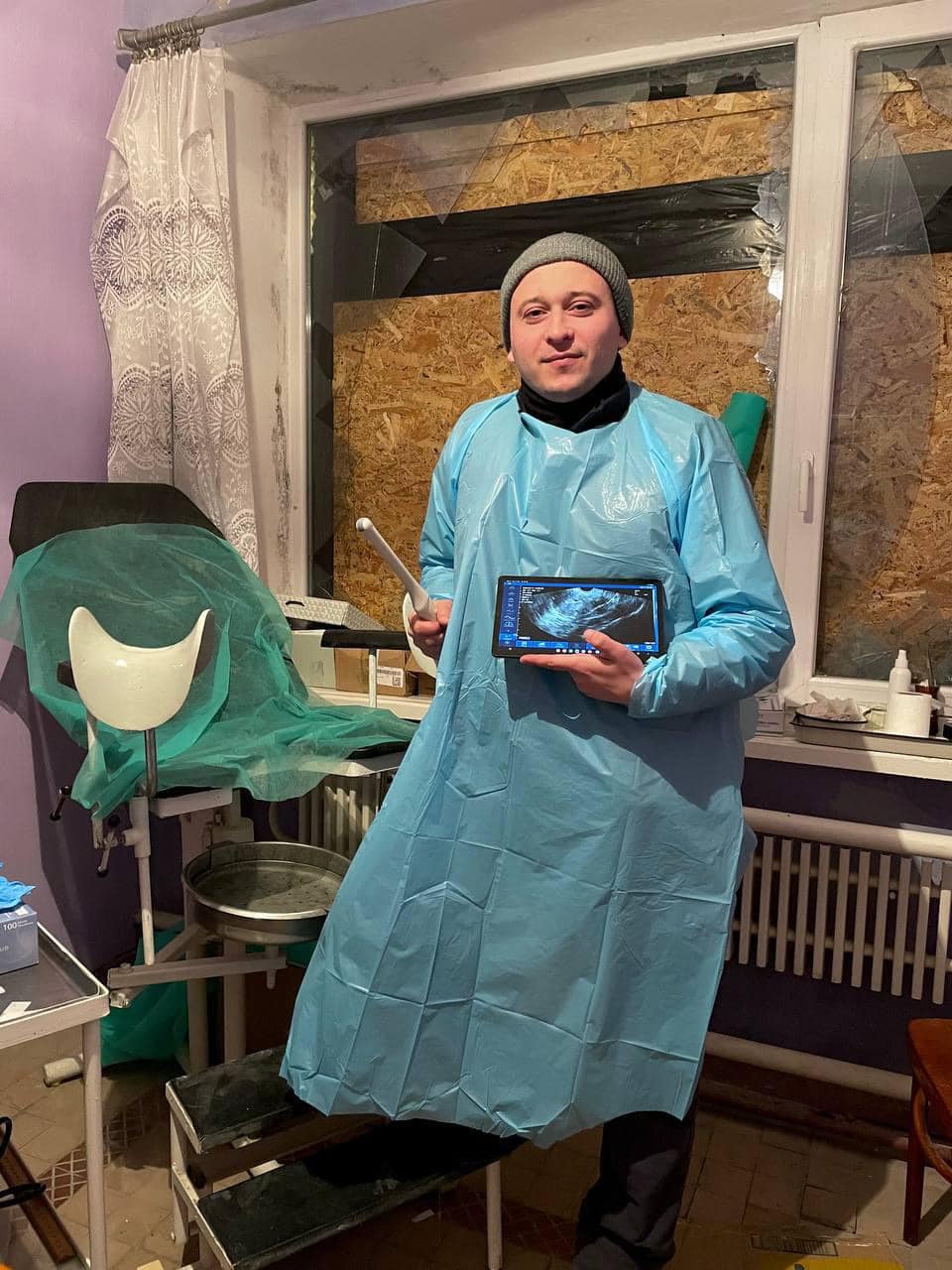
Anton Belinsky, photo from personal archive
Anton is convinced that quality medical assistance is essential for citizens to feel that the state genuinely cares about them:
“On de-occupied territories, many people had not experienced quality medical care, even before the full-scale invasion, and now the situation is even worse. Many people are depressed. And such trips help maintain trust in the state, medicine, and the legal system,” Anton Belinsky told our journalists.
While on the frontline, the doctor, alongside colleagues, had to work almost beyond their limits due to the overwhelming number of patients. In such demanding conditions, he drew several important conclusions to enhance the practice of medicinal treatment. Firstly, to provide proper medical care, healthcare professionals must have access to the necessary equipment. Secondly, of great importance is a proper educational process for interns. Anton noted that many hospitals harbor privileged medical professionals who are reluctant to mentor young specialists out of fear of competition. Anton himself is unafraid of this, believing that a self-sufficient doctor will willingly teach as a contribution to propelling the medicinal field forward.
Finally, an essential element for the advancement of medicine is fair compensation. According to Anton, if an adequate level of remuneration is not established, healthcare professionals may either exit the field or perform their duties half-heartedly merely to avoid additional stress. Anton Belinsky firmly believes that after work, a healthcare professional should not be preoccupied with seeking additional income or contemplating cost-cutting measures.
“There should be a certain level of payment so that individuals can afford to rest and recuperate. To be concerned not about the salary, but about the patient,” says Anton.
It is important to highlight that, as of today, the salary for a doctor in Ukraine before tax deductions is set at 20,000 hryvnias, while that of a nurse – at 13,500 hryvnias. However, when considering qualifications and responsibilities, even this promised salary appears exceedingly modest compared to the average wage in Ukraine. For example, a nurse currently earns less than a cashier, a loader, or a cook, who, according to the work.ua job search site, have an average salary of 14-18 thousand hryvnias. Furthermore, not all healthcare workers receive the pledged remuneration, making the salaries inadequate to cover basic needs such as housing, childcare and education, and personal health. Consequently, nurses often find themselves seeking additional employment or relying on the support of relatives.
Pressure on All Levels
Some may argue that the incomes of healthcare workers are significantly higher than their official salaries because many patients unofficially "thank" the doctors. Such cases are indeed widespread. However, this situation has emerged due to the many years of chronic underfunding in the healthcare system, leading to the inadequate salaries that qualified medical professionals are currently receiving.
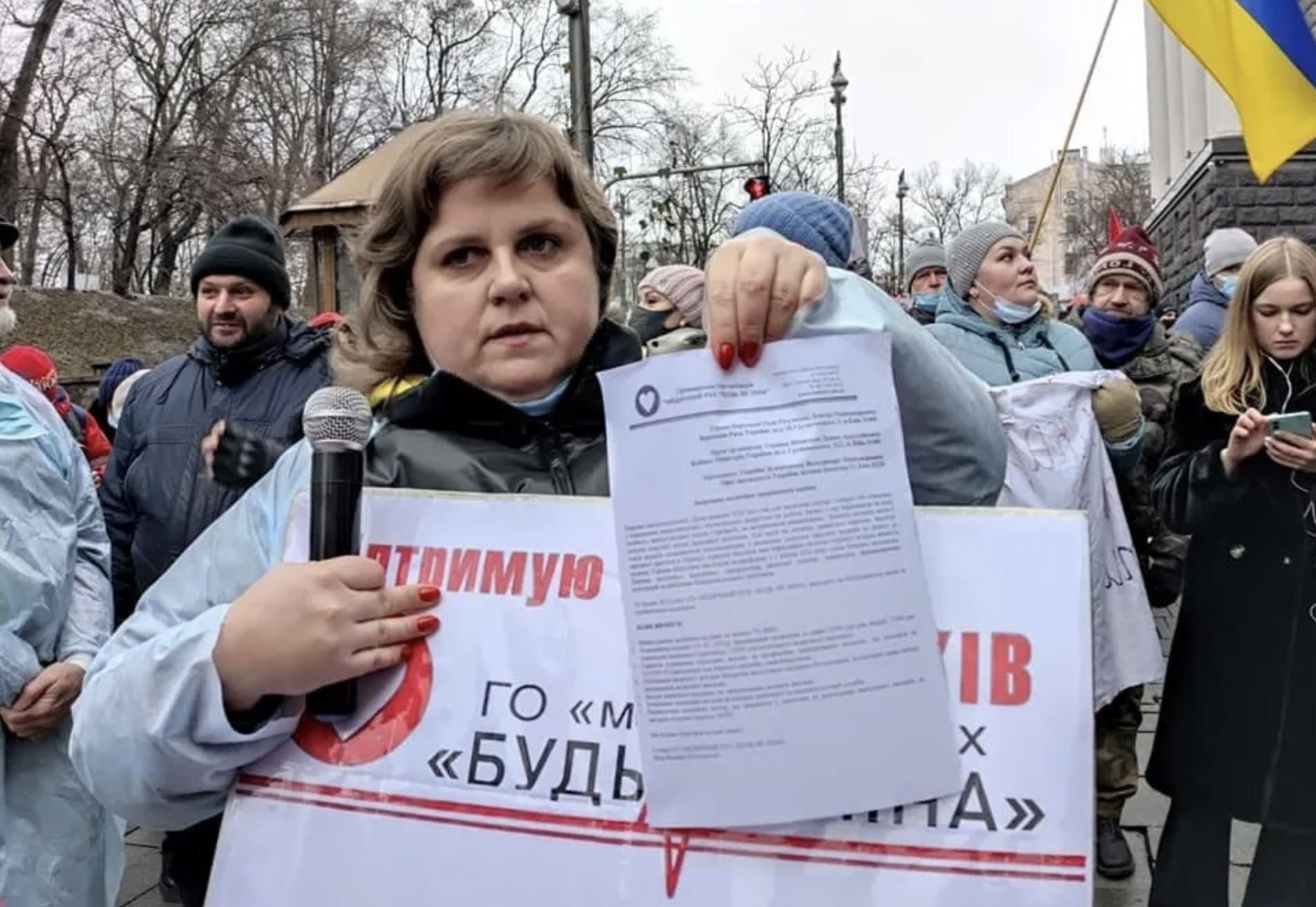
Oksana Slobodyana, head of the public movement “Be Like Nina” during a protest in Kyiv. Photo: medryh.com.ua
Beyond salary concerns, many healthcare workers today face mistreatment from the administrations of medical institutions. As Oksana Slobodyana, head of the public movement “Be Like Nina,” informed Commons, administrators of medical facilities often attempt to cut costs on medical staff by reducing salaries or laying off employees. Nurses and sanitation workers are often the first to be affected, as dismissing doctors puts the medical facility at risk of losing funding from the National Health Service of Ukraine (NHSU). As a result, nurses are burdened with additional workloads, and there are numerous cases where one nurse has to serve 40-60 patients. The same challenges extend to sanitation workers. Oksana Slobodyana notes that younger medical personnel are now expected to excel in cleaning and patient care, even though the workload is not fixed and does not correlate with the employee's knowledge and skills. This approach significantly diminishes people's motivation to work.
“Beyond the administration of medical institutions, there is also local government, for whom medicine is, frankly speaking, a drain on budget funds. In this case, the head of the united territorial community (UTC), who is far removed from the medical field, does not think strategically, and tries to either get rid of the hospital by closing it, or to minimize the number of medical staff. There are many such cases now. For example, in Pryluky, Chernihiv Oblast, there is an ongoing attempt to liquidate the city hospital. However, an independent trade union, established for this purpose, has successfully prevented the complete liquidation of the medical institution and the dismissal of its staff for the past six months,” Oksana Slobodyana recounted.
We also reported on how the authorities of the city of Sosnivka in Lviv Oblast tried to close down a hospital. Fortunately, due to the efforts of local nurse Oksana Gladun, head of the primary trade union organization of Free Medical Workers of Ukraine, and with the support of medical workers and local residents, this attempt was unsuccessful.
The maintenance of hospitals today is entrusted to local self-governing bodies. However, not all united territorial communities (UTCs) have the resources for this. At the same time, the central government continues to demand improvements in the work of hospitals, but achieving this is not possible in every community. A burden for medical institutions is the recent requirement to install air conditioners in every hospital room of a capable network. Otherwise, medical institutions are to lose the opportunity to contract with the NHSU for certain packages from January 1, 2024. According to the Ministry of Health, out of 54 thousand hospital rooms, only 12% have air conditioners. Oksana Slobodyana believes that in medical institutions where there have been no repairs for 30 years, the mandate to install air conditioners could result in their closure. Simultaneously, she notes that representatives of the NHSU primarily criticize instead of providing solutions to problems.
“As one of the doctors in Zakarpattia said: ‘Don't tell me what to do. I know that myself. Tell me what funds I should do it with,’” she related.
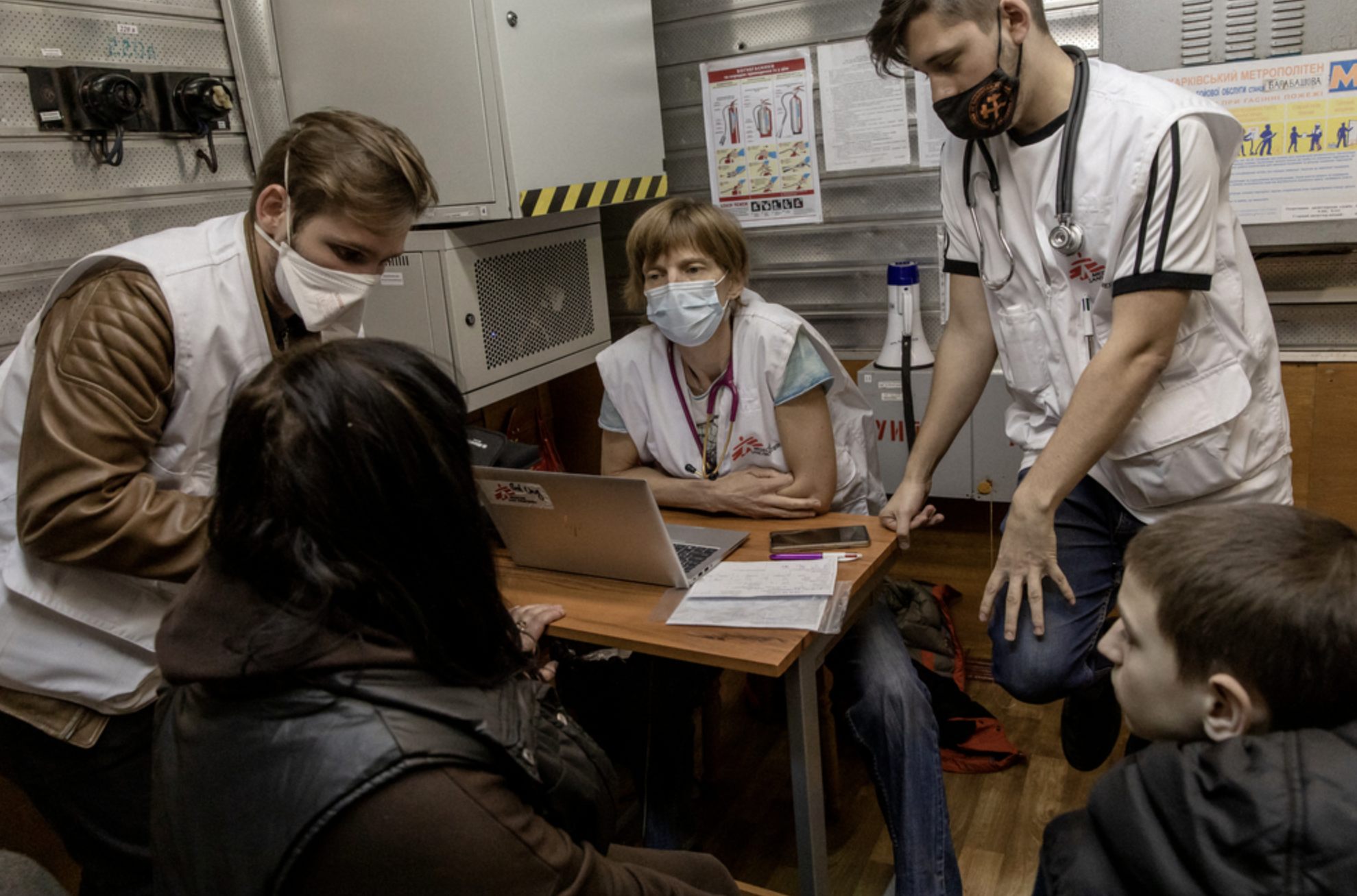
The doctor conducts a medical consultation at the Doctors Without Borders mobile clinic at the metro station in Kharkiv. Photo: Adrienne Surprenant/MYOP
On its part, the government has opted to increase salaries for healthcare workers in front-line territories and areas of hostilities, as outlined in the relevant Ministry of Reintegration order. For instance, remuneration in the combat zones is structured as follows: doctors receive 28,000 UAH per month, nurses 18,000 UAH, and junior medical workers 9,000 UAH. In potential combat zones (front-line territories), these figures are adjusted to 23,000 UAH, 15,500 UAH, and 8,000 UAH, respectively. Nevertheless, reports on social media indicate that not all medical professionals are receiving these funds. The government has transferred the responsibility for additional payments to local budgets, but healthcare institutions and UTCs lack funds. Specifically, employees of medical institutions in Kakhovka, Shostka, Mykolaiv, Nikopol, the city of Selydove, and many others express concerns about the lack of these supplementary payments.
According to Oksana Slobodyana, in Kherson, doctors are compelled to take on one and a half positions to access additional earnings, leading to significant and demanding workloads. It is crucial for the government to consider such situations and implement appropriate measures, given that the order on allowances in the Ministry of Health was presented as an indication of the government's commitment to the well-being of healthcare workers.
Funding: The Cornerstone of Healthcare
The stories we’ve shared highlight a significant issue with the remuneration of healthcare workers. Additionally, insufficient funds are allocated for the purchase of medicines and equipment, as well as for the maintenance of hospitals. This chronic underfunding has persisted for years. To illustrate, while the European Union allocates 9-10% of its GDP to healthcare, Ukraine allocates only about 4%.
There are intentions to improve the situation. The law "On State Financial Guarantees for Medical Services to the Population" specifies that the volume of funds from the state budget of Ukraine for financing the medical guarantees program is expected to be 5% of the GDP. However, due to the war and destruction, achieving this may be unlikely at the moment. Regarding healthcare funding in the near future, for the year 2024, according to the Ministry of Health, 202 billion UAH will be allocated for healthcare, or less than 3% of the GDP, taking into account the expected nominal GDP forecast of 7.8 trillion UAH for the next year.
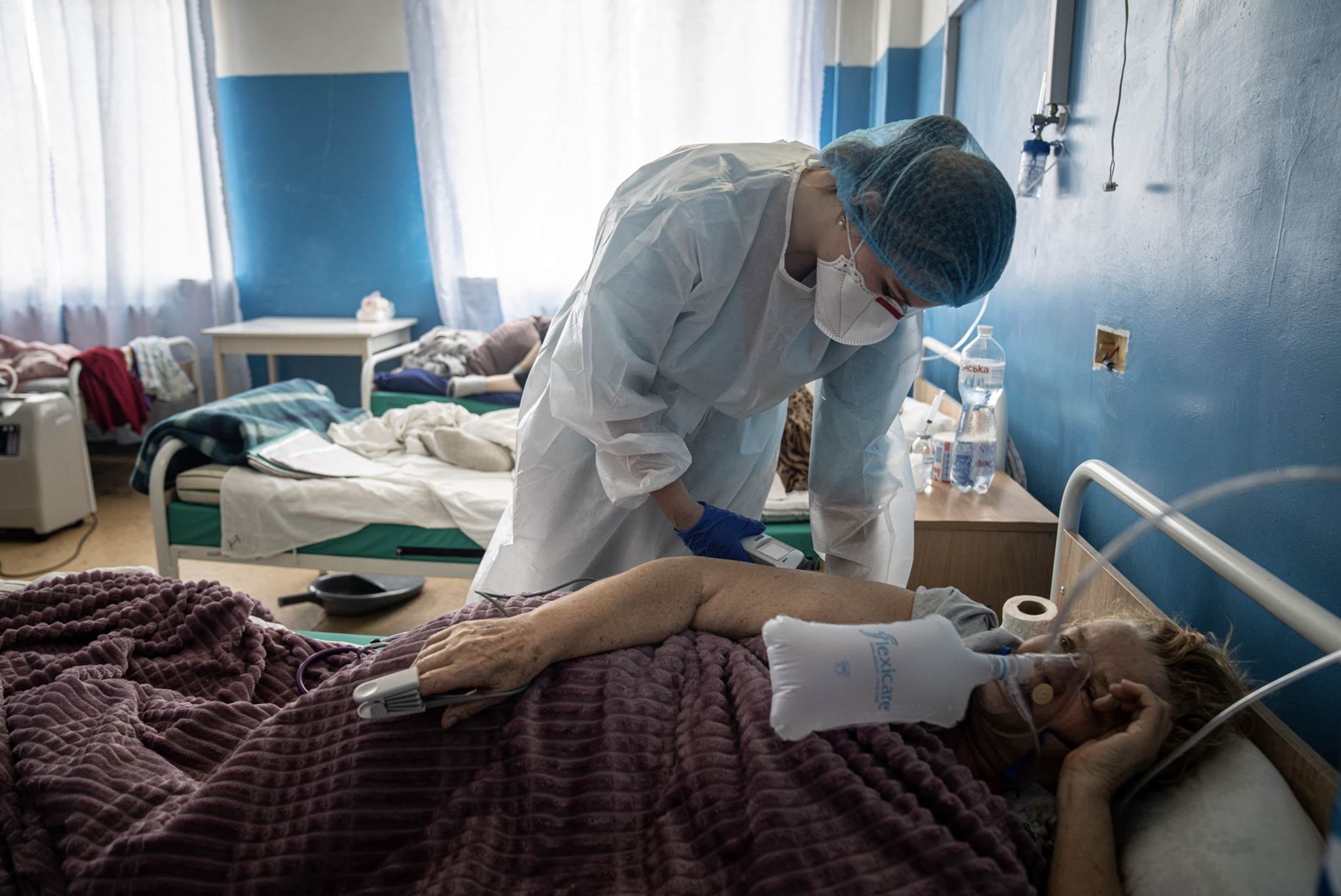
Illustrative photo: Ministry of Health
No matter how challenging the situation in the country may become, economist Oleksiy Plotnikov is confident that the government will inevitably need to prioritize healthcare funding. In his view, post-war, a significant number of individuals in the country, both among servicemen and the civilian population, will have experienced health difficulties. If financial resources are limited, he believes the government is more likely to reduce funding for science, culture, and even education, rather than making cutbacks in the healthcare sector.
But can the state ensure an acceptable level of medical care for the population even with stringent economic measures? Oleksiy Plotnikov is confident that it can. In his opinion, international partners will persist in providing support to Ukraine, offering the country a chance to recover using its own resources, although he acknowledges that this process will take years.
Simultaneously, according to some economists, addressing economic challenges requires the state to take decisive action. This may include introducing progressive taxation for the wealthiest, seizing excessive property of oligarchic capital, and negotiating the cancellation of Ukraine's external debt. Oleksiy Plotnikov, on his part, places great hope in Ukraine's accession to the European Union, which would facilitate the country in attracting resources, particularly for the advancement of the healthcare system. Notably, on November 8th, the European Commission recommended initiating negotiations on Ukraine's accession to the European Union. However, the ultimate path that the country will choose will unfold over time.
***
In conclusion, the healthcare sector becomes of paramount importance in times of war. The state ought to allocate greater attention to it than in preceding years, focusing on improving conditions for healthcare workers, upgrading hospitals facilities, ensuring the availability of proper equipment and medicines, and augmenting overall healthcare funding. To achieve this, the state must re-evaluate its priorities. Successfully reforming any societal institution necessitates addressing systemic issues, therefore, a socially oriented state policy is crucial. Many Ukrainians recognize the need for such social changes and are willing to contribute to enhancing life in the country. The dedicated efforts of healthcare professionals are one illustration of this commitment.
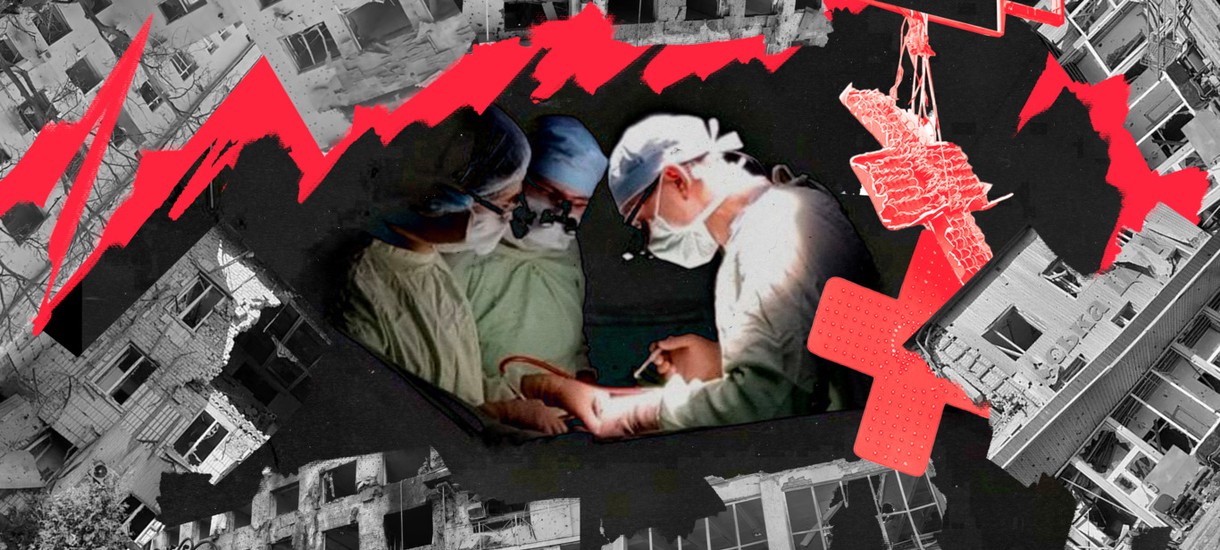
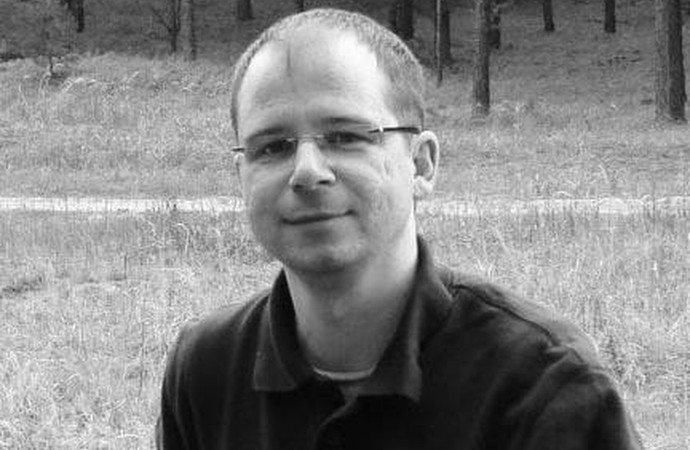
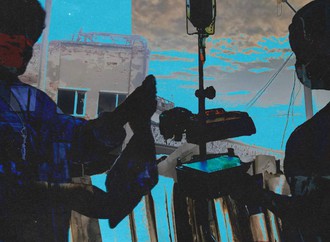
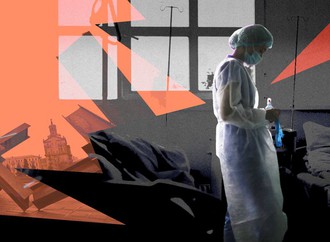
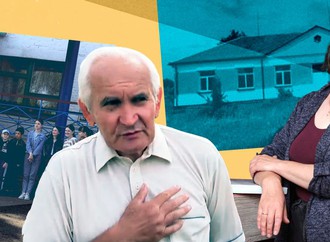
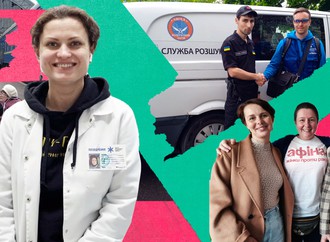
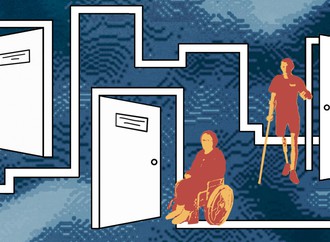
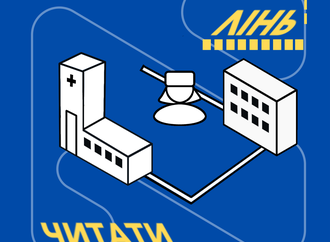
_category.jpg)
